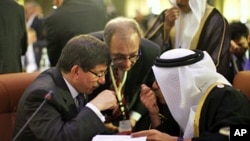Representatives of about 70 countries and organizations are meeting in Tunis to coordinate international efforts to deliver humanitarian relief and political change to Syria. At the opening session, officials called on Syrian President Bashar al-Assad to end the violence and allow humanitarian aid to be delivered.
Tunisia's foreign minster, Rafik Abdessalem, welcomed the delegates at this hastily-called meeting, designed to further increase pressure on the Syrian regime.
Representatives from entities as varied as the United States, Yemen and the Holy See were expected to agree to a plan involving humanitarian aid, pressure through sanctions and diplomatic isolation, and support for the Syrian opposition.
Tunisia's new president, Moncef Marzouki, said there should be no armed foreign intervention, but he called for intensified efforts to convince President Assad to end the bombardment of opposition supporters and step down.
Heard here through an interpreter, he called for the help of Syria's main international supporters, who vetoed a United Nations Security Council resolution.
“The Russians and the Chinese who have influence on the Syrian leadership [should] urge it not to be stubborn and obstinate by continuing a policy that will only lead to the vandalism and destruction of Syria,” Marzouki said.
The chairman of the Arab League Council of Ministers, Hamad bin Muhammad al Thani of Qatar, called for the formation of an Arab and International force to secure humanitarian aid corridors, but other participants indicated they do not want a confrontation with the Syrian military.
The conference is expected to call on the Assad regime to allow the immediate delivery of humanitarian aid.
In remarks prepared for delivery in the conference's closed session, U.S. Secretary of State Hillary Clinton endorsed the Arab League transition plan for Syria, which President Assad has ignored, and called for a negotiated political settlement.
She also announced an additional $10 million of funding to help Syrians who have fled the fighting. She said if President Assad does not allow aid to get through, he will have even more blood on his hands, and so will governments that support him.
The Friends of Syria plan to continue their effort, including preparations for a future democratic Syria, with a second meeting planned for Turkey next month, and another in France in April.
| Join the conversation on our social journalism site - Middle East Voices. Follow our Middle East reports on Twitter and discuss them on our Facebook page. |




